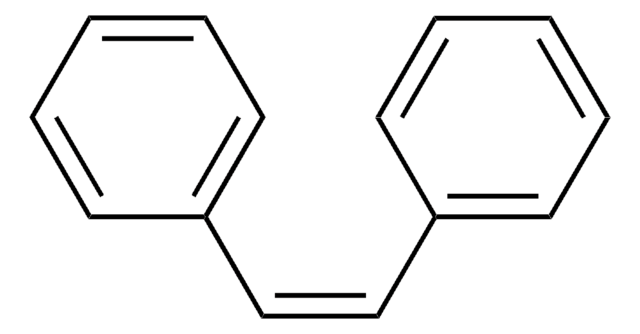All Photos(1)
About This Item
Linear Formula:
HC≡C(CH2)5C≡CH
CAS Number:
Molecular Weight:
120.19
EC Number:
MDL number:
UNSPSC Code:
12352100
PubChem Substance ID:
NACRES:
NA.22
form:
liquid
Assay:
98%
Recommended Products
Quality Level
Assay
98%
form
liquid
refractive index
n20/D 1.449 (lit.)
bp
55-55.5 °C/13 mmHg (lit.)
mp
−21 °C (lit.)
density
0.799 g/mL at 25 °C (lit.)
storage temp.
2-8°C
SMILES string
C#CCCCCCC#C
InChI
1S/C9H12/c1-3-5-7-9-8-6-4-2/h1-2H,5-9H2
InChI key
DMOVPHYFYSASTC-UHFFFAOYSA-N
General description
1,8-Nonadiyne undergoes one-step hydrosilylation reaction for attaching acetylene-terminated alkyl monolayers to nonoxidized crystalline silicon surfaces.
Application
1,8-Nonadiyne was used as starting reagent in the synthesis of 2,6-hexadecadiynoic acid, 2,6-nonadecadiynoic acid and 2,9-hexadecadiynoic acid.
Signal Word
Warning
Hazard Statements
Precautionary Statements
Hazard Classifications
Eye Irrit. 2 - Flam. Liq. 3 - Skin Irrit. 2 - STOT SE 3
Target Organs
Respiratory system
Storage Class Code
3 - Flammable liquids
WGK
WGK 3
Flash Point(F)
107.6 °F - closed cup
Flash Point(C)
42 °C - closed cup
Personal Protective Equipment
dust mask type N95 (US), Eyeshields, Gloves
Choose from one of the most recent versions:
Already Own This Product?
Find documentation for the products that you have recently purchased in the Document Library.
Néstor M Carballeira et al.
Lipids, 41(5), 507-511 (2006-08-29)
The hitherto unknown 2,6-hexadecadiynoic acid, 2,6-nonadecadiynoic acid, and 2,9-hexadecadiynoic acid were synthesized in two steps and in 11-18% overall yields starting from either 1,5-hexadiyne or 1,8-nonadiyne. Among all the compounds 2,6-hexadecadiynoic acid displayed the best overall antifungal activity against both
Stephen G Parker et al.
Nature communications, 9(1), 2288-2288 (2018-06-14)
For many normal and aberrant cell behaviours, it is important to understand the origin of cellular heterogeneity. Although powerful methods for studying cell heterogeneity have emerged, they are more suitable for common rather than rare cells. Exploring the heterogeneity of
Yan B Vogel et al.
Nature communications, 8(1), 2066-2066 (2017-12-14)
Predicting or manipulating charge-transfer at semiconductor interfaces, from molecular electronics to energy conversion, relies on knowledge generated from a kinetic analysis of the electrode process, as provided by cyclic voltammetry. Scientists and engineers encountering non-ideal shapes and positions in voltammograms
Benjamin S Flavel et al.
Langmuir : the ACS journal of surfaces and colloids, 29(26), 8355-8362 (2013-06-25)
Poly(ethylene glycol) (PEG) is one of the most extensively studied antifouling coatings due to its ability to reduce protein adsorption and improve biocompatibility. Although the use of PEG for antifouling coatings is well established, the stability and density of PEG
Janneke Veerbeek et al.
ACS applied materials & interfaces, 9(1), 413-421 (2016-12-10)
Silicon-based solar fuel devices require passivation for optimal performance yet at the same time need functionalization with (photo)catalysts for efficient solar fuel production. Here, we use molecular monolayers to enable electrical passivation and simultaneous functionalization of silicon-based solar cells. Organic
Our team of scientists has experience in all areas of research including Life Science, Material Science, Chemical Synthesis, Chromatography, Analytical and many others.
Contact Technical Service








